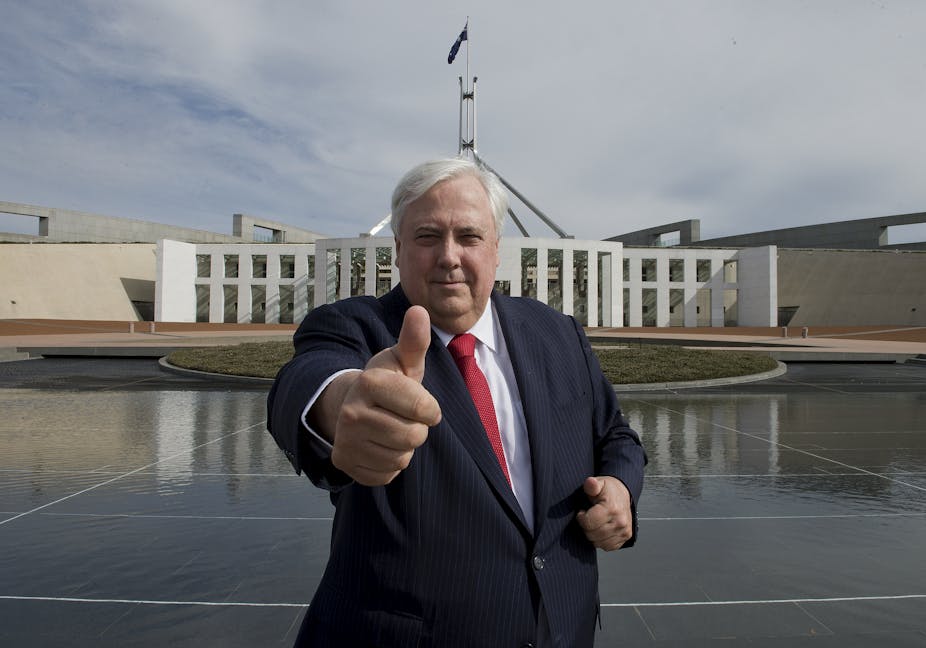Talk to mining billionaire Clive Palmer and you move into a different zone, where normal laws of probability are not applied. Palmer says polling over the last few days suggests he can win two Senate seats in Queensland, and other Senate spots around the country. And House of Representatives seats as well.
Who did that polling? He and his staff and volunteers. How may people did they poll? About 1780. How many calls did he make? About a dozen, he tells The Conversation.
Coming back to the reality of mainstream polling, Nielsen figures for Queensland published in the Australian Financial Review give more modest encouragement to the Palmer United Party (PUP). The weekend polling suggests it is in the hunt for a Queensland Senate seat, giving its candidate, former rugby league player Glenn Lazarus, the possibility of a share of the Senate balance of power after June.
In the Nielsen poll PUP, on 8%, has outstripped Bob Katter’s Katter’s Australian party (on 4%); PUP’s vote equals the Greens’ vote.
There seems a big element of money talking in the PUP support. Palmer is able to pour far more resources into his campaign than KAP can match.
Palmer is running candidates in every House seat in the country – one in Victoria was disendorsed but remains on the ballot paper - far more than Katter. This boosts PUP’s Senate vote.
Its candidate for the Victorian seat of Wannon, Bradley Ferguson, had never visited the place until this week. Palmer says Wannon was the last seat for which the party needed to find someone. He has known Ferguson since he was three years old; Ferguson, from Townsville, works at his nickel refinery. Palmer says about dozen of his candidates are his employees. The number two candidate on the Queensland Senate ticket is his nephew.
Palmer condemns the election campaign generally as “one of the worst I’ve ever seen”, with “no debate about policies” and “no ideas”, and complains that neither Kevin Rudd nor Tony Abbott will debate him.
He and Katter had a debate at the National Press Club last week but it was more love-in than clash.
ABC election analyst Antony Green gives PUP “a very strong chance” of a Queensland Senate seat if it can hold to 8%. With so many parties running in the Senate – 36 in Queensland – “nobody has the faintest idea of how the votes are going to go [with the micro parties]”, he says. Green also notes: “There is no other electoral system in the world that would deliver victory to candidates that trail so far behind in the vote.”
Liberal National Party senator Ron Boswell, who is not contesting the election but will be in the Senate until June, says the outcome of the battle for the floating Queensland Senate seat will be “Russian roulette.”
Boswell says the preference deals that have been stitched up mean “you vote for something and could get anything. You could vote for the car enthusiasts and get the shooters.
"If you vote for Palmer you have a very good chance of getting a Green. If you vote for Katter you have a chance of getting Labor.”
He describes the preference pyramid (“put together by a consultant”) “where little parties feed into bigger parties which feed into bigger parties again” as “a complete abrogation of any form of democracy”, and tells people to “send your vote to where you know it’s going to end.”
Former Nationals leader and deputy prime minister John Anderson has a video on YouTube with the same warning. “The reality is, and it’s quite possible, you’ll vote for somebody thinking they are going to build you a bigger, better, stronger country and you’ll end up with some wacko destructive individual pursuing some idiotic green agenda or something, that was your last intent,” he says.
“These minor parties have stitched up deals that are so hard to read and, in my view, so anti-democratic they should be rewarded with nothing other than failure.”
Palmer is a passionate opponent of the carbon tax so one would expect a PUP senator to vote enthusiastically for its repeal. But Palmer says “not necessarily – if [the repeal] didn’t go far enough. Our policy is to provide refunds to consumers” for the higher electricity prices they have suffered. And he’s no fan of Abbott’s paid parental leave scheme. But he adds that PUP would exercise what Senate power it had “responsibly”.
Abbott would much prefer a PUP to a Green. But it sounds as though a PUP could still be a bit of a handful.

